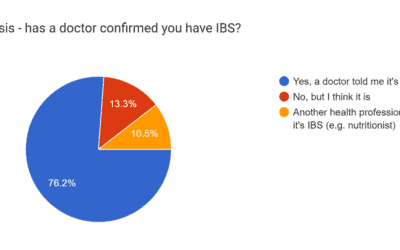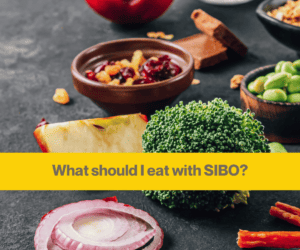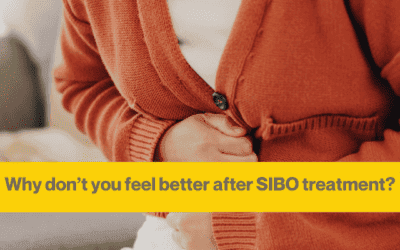We all know that iron is an essential mineral for our health, but did you know our gut bacteria also rely on it? So could gut bacteria cause anaemia, due to their need for this essential mineral?
As humans, we don’t have a way to get rid iron, except through losing blood in periods or other blood loss (which is normally undesirable!). This means there is a very sensitive dynamic process for absorbing it from what we eat so we don’t get overloaded with it, but keep it at steady level.
Your gut microbes play a part in how well you absorb iron, for better or worse.
SUMMARY – Can’t be bothered to read a whole blog? Well if you want a short answer – yes your gut microbes can affect absorption, and can be associated with anaemia.
How we absorb iron from our food
Iron is mostly absorbed in the small intestine, in the duodenum. If your diet is low in iron rich foods such as red meat, eggs, green leafy veg and pulses then your digestive tract will increase absorption.
There are two types of iron from our food, heme iron from animal products which is well absorbed. We can also absorb non-heme iron from plant based foods, but it’s not as easy for us to use this type of iron. Iron is best absorbed when the environment is more acidic, which is why eating vitamin C rich foods with plant based iron sources helps absorption.
Our liver plays an important role here too, producing a hormone called hepcidin, which reduces absorption when the body senses there is enough iron available.

How gut bacteria can affect iron absorption
Some of your gut microbes produce metabolites which can reduce iron absorption and may also increase the iron-storage protein ferritin. This will result in less iron being absorbed.
The researchers also found that mice without any gut bacteria don’t become as anaemic as normal mice when they are fed a low iron diet. The low iron mice upregulated iron absorption when there was no interference from the gut bacteria.
Helicobacter-pylori is a bacteria which infects the stomach, and is also associated with iron deficiency anaemia. There may be a case for treating the H pylori to increase levels of iron.
How do you stop bacteria stealing your iron?
We protect our iron in a few ways, mainly
- Locking it away from bacteria
- Turning down iron absorption when we sense bacteria overgrowth
1. Locking it away
One of the first ways we defend our body from invading bug is to keep our iron away from them. In fact, it’s so precious to us there is rarely any of it just hanging around in your body.
It’s either locked up inside your cells, or bound to a transport protein called transferrin. This means that pathogenic bacteria normally don’t have free access to iron from your diet.
However, some crafty bacteria can get round this defence, by taking the iron for themselves. Some bacteria can release molecules called siderophores, which allows them to take it from our iron-binding proteins. These siderophores are actually better at obtaining the iron than our human cells are!
During an acute infection, bacteria can also invade your cells causing iron to be released. So when you have an overgrowth of bacteria in the small intestine (SIBO), you may struggle to absorb iron effectively. (If you need a reminder of SIBO I’ve written about it previously and you can catch up here).
2. Controlling our own absorption
Your liver cells are also involved in regulating how much iron you absorb from your food. When you have enough iron stored your liver will release a hormone called hepcidin which stops more iron being taken in. Your liver cells will also do this when they sense inflammation, such as an overgrowth of bacteria.
So when you have too much bacteria (as in SIBO) your body wants to stop the bacteria accessing too much iron, and reduces absorption through hepcidin.

Can gut bacteria help iron absorption?
It’s not all bad, some bacteria in our gut help us absorb more iron from our diet. If you have high levels of lactic acid forming bacteria such as lactobacilli, and Bifidobacterium you might absorb more iron.
The gut bacteria species Lactobacillus can sense intestinal iron levels and change the amount you absorb from your food. They can actually help us absorb more. They do this by:
- reducing intestinal pH (to more acidic which is good for iron absorption)
- changing our gut microbiota metabolism
- creating more Short Chain Fatty Acids
The probiotic Lactobacillus plantarum 299v (Lp299v) has been shown to improve iron absorption in healthy white Europeans, mostly women.
Anaemia and your immune system
When you don’t have enough iron available for your own use, your antimicrobial defence cells in the immune system might not work as well. This could mean you might be more susceptible to further infections.
Why supplementation isn’t always a good idea
You may think you have insufficient iron, but unless you’ve got evidence of low levels I don’t recommend supplementing. This is because more definitely isn’t always better.
When there is more iron that isn’t bound to transferrin, bacteria can use it to multiply. Some studies have shown that when healthy adults were given oral supplementation of iron had increased bacterial growth. (To be fair, the study gave them a huge dose when they didn’t need it – 2 mg/kg/day).
Also, people who have too much iron, in conditions such as hemochromatosis or thalassemia, are more susceptible to certain infections.
If you don’t really need extra iron, it’s not a good idea to supplement.
If your iron levels are low and you just can’t increase them, perhaps it’s time to look at your gut health and change the gut bacteria.

IBS Nutritionist
Hi, I'm Anna Mapson, registered Nutritional Therapist.
I help people with IBS and SIBO get control of unpredictable gut symptoms to find long term relief from painful and embarrassing IBS without restrictive dieting.
I can help you to:
- understand your digestion better, so you recognise your triggers
- eat a well balanced diet, with tasty meals that are simple to prepare
- reintroduce your trigger foods so you can get back to enjoying food again
Find more about my 3 month 1:1 Gut Reset programme.
The impact of IBS on daily life
The struggles of IBS: A new survey reveals the profound impact on daily life. I ran a survey with my audience about the impact of IBS, and the way Irritable Bowel Syndrome (IBS) affects your day-to-day lives is really clear. I already knew from my work with clients...
What’s the best SIBO diet for treating and getting rid of symptoms?
What to eat when you have SIBO If you've got SIBO you might be desperately searching for what to eat to help yourself feel better. In this post I want to share more about how different diets affect SIBO, and how to decide what to eat. Understanding SIBO SIBO occurs...
8 reasons you don’t feel any better after SIBO treatment
Small Intestinal Bacterial Overgrowth is very tricksy kind of condition, so it's common to try a treatment and then not feel better. Here are my reasons as an IBS & SIBO nutritionist why it's hard to be rid of symptoms. What is SIBO? Small Intestinal Bacterial...





Beautiful and eye opening information.
Very few sources out there linking anemia to gut microbiome.
Love from India